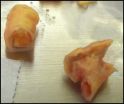(Press-News.org) WASHINGTON, DC – June 10, 2014 - Scientists believe they have an explanation for the axiom that stress, emotional shock, or overexertion may trigger heart attacks in vulnerable people. Hormones released during these events appear to cause bacterial biofilms on arterial walls to disperse, allowing plaque deposits to rupture into the bloodstream, according to research published in published today in mBio®, the online open-access journal of the American Society for Microbiology.
"Our hypothesis fitted with the observation that heart attack and stroke often occur following an event where elevated levels of catecholamine hormones are released into the blood and tissues, such as occurs during sudden emotional shock or stress, sudden exertion or over-exertion" said David Davies of Binghamton University, Binghamton, New York, an author on the study.
Davies and his colleagues isolated and cultured different species of bacteria from diseased carotid arteries that had been removed from patients with atherosclerosis. Their results showed multiple bacterial species living as biofilms in the walls of every atherosclerotic (plaque-covered) carotid artery tested.
In normal conditions, biofilms are adherent microbial communities that are resistant to antibiotic treatment and clearance by the immune system. However, upon receiving a molecular signal, biofilms undergo dispersion, releasing enzymes to digest the scaffolding that maintains the bacteria within the biofilm. These enzymes have the potential to digest the nearby tissues that prevent the arterial plaque deposit from rupturing into the bloodstream.
According to Davies, this could provide a scientific explanation for the long-held belief that heart attacks can be triggered by a stress, a sudden shock, or overexertion
To test this theory they added norepinephrine, at a level that would be found in the body following stress or exertion, to biofilms formed on the inner walls of silicone tubing.
"At least one species of bacteria - Pseudomonas aeruginosa - commonly associated with carotid arteries in our studies, was able to undergo a biofilm dispersion response when exposed to norepinephrine, a hormone responsible for the fight-or-flight response in humans," said Davies. Because the biofilms are closely bound to arterial plaques, the dispersal of a biofilm could cause the sudden release of the surrounding arterial plaque, triggering a heart attack.
To their knowledge, this is the first direct observation of biofilm bacteria within a carotid arterial plaque deposit, says Davies. This research suggests that bacteria should be considered to be part of the overall pathology of atherosclerosis and management of bacteria within an arterial plaque lesion may be as important as managing cholesterol.
INFORMATION:
mBio® is an open access online journal published by the American Society for Microbiology to make microbiology research broadly accessible. The focus of the journal is on rapid publication of cutting-edge research spanning the entire spectrum of microbiology and related fields. It can be found online at http://mbio.asm.org.
The American Society for Microbiology is the largest single life science society, composed of over 39,000 scientists and health professionals. ASM's mission is to advance the microbiological sciences as a vehicle for understanding life processes and to apply and communicate this knowledge for the improvement of health and environmental and economic well-being worldwide.
Bacteria help explain why stress, fear trigger heart attacks
2014-06-10
ELSE PRESS RELEASES FROM THIS DATE:
Fox Chase doctors urge caution over new analysis of Medicare payments
2014-06-10
PHILADELPHIA, PA (June 9, 2014)—There's much to learn from the recent release of unprecedented amounts of data from the nation's second largest health insurer, Medicare, but only if interpreted cautiously, write two doctors at Fox Chase Cancer Center in the June 9 online edition of the Annals of Internal Medicine.
In April, the Centers for Medicare and Medicaid Services (CMS) released the most detailed data in its history, related to $77 billion worth of physician billings to Medicare. In its analysis of the data, The New York Times showed that only a small percentage ...
Lifetime cancer risk from heart imaging low for most children; rises with complex tests
2014-06-09
DURHAM, N.C. -- Children with heart disease are exposed to low levels of radiation during X-rays, which do not significantly raise their lifetime cancer risk. However, children who undergo repeated complex imaging tests that deliver higher doses of radiation may have a slightly increased lifetime risk of cancer, according to researchers at Duke Medicine.
The findings, published June 9, 2014, in the American Heart Association journal Circulation, represent the largest study of cumulative radiation doses in children with heart disease and associated predictions of lifetime ...
'Jekyll and Hyde' protein linked to type 1 diabetes
2014-06-09
Researchers are a step closer to establishing the link between a protein with a split personality and type 1 diabetes.
New research, published today in the journal PNAS, shows how a protein, called GAD65, changes its shape when it turns itself on and off. Curiously, this characteristic may also link it to type 1 diabetes.
In the human brain, GAD65 performs an essential role: it makes 'neurotransmitters' - chemicals that pass messages between brain cells.
GAD65 is also found in the pancreas. Previous studies linked it to type 1 diabetes because the body makes antibodies ...
Mount Sinai researchers identify protein that keeps blood stem cells healthy as they age
2014-06-09
(New York – June 9, 2014) -- A protein may be the key to maintaining the health of aging blood stem cells, according to work by researchers at the Icahn School of Medicine at Mount Sinai recently published online in Stem Cell Reports. Human adults keep stem cell pools on hand in key tissues, including the blood. These stem cells can become replacement cells for those lost to wear and tear. But as the blood stem cells age, their ability to regenerate blood declines, potentially contributing to anemia and the risk of cancers like acute myeloid leukemia and immune deficiency. ...
Viewing plant cells in 3-D (no glasses required)
2014-06-09
VIDEO:
This shows 3-D ortho-rotation of leaf mesophyll cells. Micrographs were collected by milling fixed tissue accompanied by SEM imaging using FIB-SEM. The complete videos published with the article are available...
Click here for more information.
Plant cells are beginning to look a lot different to Dr. A. Bruce Cahoon and his colleagues at Middle Tennessee State University (MTSU). They've adopted a new approach that combines the precision of an ion beam with the imaging ...
Needle biopsy underused in breast cancer diagnosis, negatively impacting diagnosis and care
2014-06-09
Needle biopsy, the standard of care radiological procedure for diagnosing breast cancer, is underused with too many patients undergoing the more invasive, excisional biopsy to detect their disease, according to research from The University of Texas MD Anderson Cancer Center.
The study, published in the Journal of Clinical Oncology, also finds that patients are often influenced by surgeons to undergo the unnecessary surgery -- a decision that's costly and can negatively impact their diagnosis and treatment.
A needle biopsy is a non-surgical procedure typically performed ...
Women and health-care providers differ on what matters most about contraception
2014-06-09
LEBANON, NH – When women are choosing a contraceptive, health care providers should be aware that the things they want to discuss may differ from what women want to hear, according to a survey published in the recent issue of the journal Contraception.
Most of the information women receive about contraceptives focuses heavily on the effectiveness in preventing pregnancy, but this information was ranked fifth in importance by women, according to the study conducted by researchers at Dartmouth College.
The researchers conducted an online survey of 417 women, aged 15-45, ...
JCI online ahead of print contents for June 9, 2014
2014-06-09
Clinical trial evaluates ex vivo cultured cord blood
Umbilical cord blood (UCB) is a rich source of hematopoietic stem and progenitor cells (HSPCs) that can be used for bone marrow transplantation; however, UCB transplantation is hampered by low numbers of HSPCs per donation, which delays engraftment and immune reconstitution. In this issue of the Journal of Clinical Investigation, Mitchell Horwitz and colleagues at Duke University Medical Center conducted a phase I clinical trial to test the long term engraftment capability of UCB HSPCs that were expanded ex vivo for ...
Newly identified B-cell selection process adds to understanding of antibody diversity
2014-06-09
BOSTON – As elite soldiers of the body's immune response, B cells serve as a vast standing army ready to recognize and destroy invading antigens, including infections and cancer cells. To do so, each new B cell comes equipped with its own highly specialized weapon, a unique antibody protein that selectively binds to specific parts of the antigen. The key to this specialization is the antigen-binding region that tailors each B cell to a particular antigen, determining whether B cells survive boot camp and are selected for maturation and survival, or wash out and die.
Now, ...
Faster, higher, stronger: A protein that enables powerful initial immune response
2014-06-09
Your first response to an infectious agent or antigen ordinarily takes about a week, and is relatively weak. However, if your immune system encounters that antigen a second time, the so-called memory response is rapid, powerful, and very effective.
Now, a team of researchers at The Wistar Institute offers evidence that a protein, called Foxp1, is a key component of these antibody responses. Manipulating this protein's activity, they say, could provide a useful pathway to boosting antibody responses to treat infectious diseases, for example, or suppressing them to treat ...



